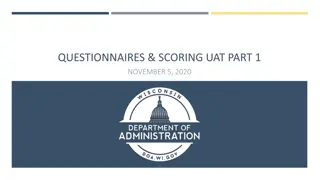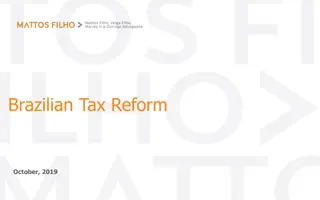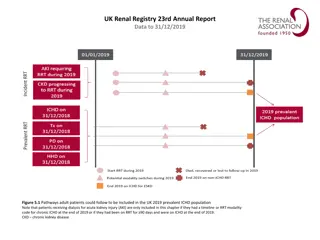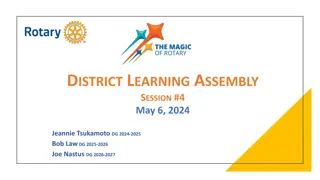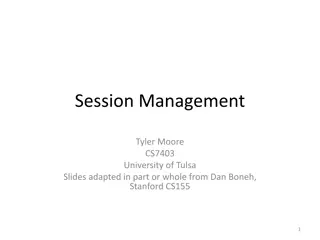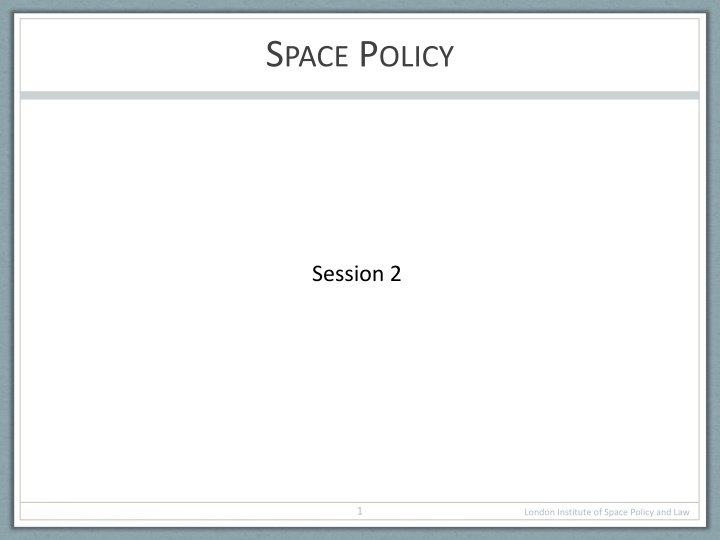
Space Policy Formulation, Objectives, and Challenges
Explore the nature of space policy formulation, objectives, and challenges including political priorities, program development, national interests, space activities, policy institutions, and key challenges in the space domain.
Uploaded on | 0 Views
Download Presentation

Please find below an Image/Link to download the presentation.
The content on the website is provided AS IS for your information and personal use only. It may not be sold, licensed, or shared on other websites without obtaining consent from the author. If you encounter any issues during the download, it is possible that the publisher has removed the file from their server.
You are allowed to download the files provided on this website for personal or commercial use, subject to the condition that they are used lawfully. All files are the property of their respective owners.
The content on the website is provided AS IS for your information and personal use only. It may not be sold, licensed, or shared on other websites without obtaining consent from the author.
E N D
Presentation Transcript
SPACE POLICY Session 2 1 London Institute of Space Policy and Law
POLICY FORMULATION Nature of Policy Identify political priorities Devise programmes and actions to deliver desired outcome US and USSR EU [Space for Europe, European Space in the World] and ESA Influences Science, Social and Economic Development Defence, Intelligence and National Security Policy vs Strategy Policy is what is, or what is not done implies a rule or guide Strategy is the methodology used to accomplish a target prescribed by policy 2 London Institute of Space Policy and Law
OPTIONS & IMPLEMENTATION 3 London Institute of Space Policy and Law
POLICY OBJECTIVES Motivation for Space Policy Protect national interests (territorial, military, etc.) Security (political, financial, personal - health, food) Disaster Monitoring Health Economic growth & security Weather Forecast Agricultural Monitoring and Planning Resource management Technological development Communication and Information technology Scientific capacity Education National Prestige 4 London Institute of Space Policy and Law
NEW POLICY FACTORS Growing Focus on Space Rapid Expansion of Activities Increasing Numbers of Participants Private Commercial Investors Reducing cost of access Wealth concentration Developing countries Coordination on Sustainability and Security Sharing Risks and Costs Earth Orbits Congested, Competed and Contested Safety, Security and Sustainability 5 London Institute of Space Policy and Law
POLICY INSTITUTIONS UN COPUOS LSC and STSC Groups of Experts Regional and National European Commission European Space Agency ESA Asia-Pacific Space Co-operation Organisation APSCO African Union National Space Agencies NASA, JAXA, UKSA IGOs with Specific Remit Inmarsat, Intelsat, ArabSat and AfriSat 6 London Institute of Space Policy and Law
POLICY CHALLENGES Treaty Adherence Registration Convention Weapons Control Operator Diversity and Coordination Differential Needs Applications for Developing Countries Industrial Policy Public Support Educate and Inform of Benefits Government Sustained Funding and Investment 7 London Institute of Space Policy and Law
CONSTRAINTS Role of WTO General Agreement on Trade in Services 1995 GATS Basic Telecoms Agreement 1997 BTA Arms Control UN Conference on Disarmament International Humanitarian Law European Union Competition Laws State Aid ESA juste retour Case No COMP/M.5168 EADS/ SSTL 8 London Institute of Space Policy and Law
SPACE POLICY REGIME Space Policy and Law Course 2019 Space Policy Principles, National and International Institutions James Cemmell Government Engagement V-P, Inmarsat; ISPL Faculty 14 October 2019, London London Institute of Space Policy and Law

